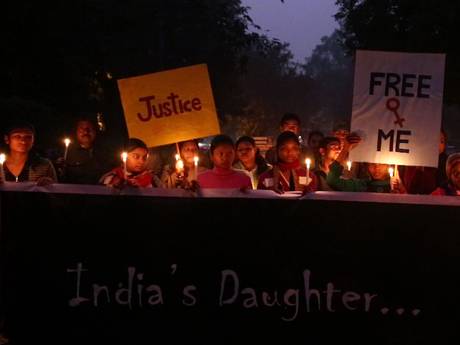The Indian government is up in arms. It has banned a documentary, India’s Daughter, which includes a reconstruction of the notorious gang rape and murder of a young woman on a bus in Delhi. Ministers can’t stop Leslee Udwin’s film being shown elsewhere – you might have seen it on BBC Four last week – but they would like it to be consigned to oblivion. It reflects badly on India, you see.
The rape of the 23-year-old student took place just before Christmas 2012, bringing thousands of people on to the streets to demand greater protection for women. All of this happened before the current prime minister, Narendra Modi, took office, but he would like the entire subject to just go away. Last month, his government shelved a plan drawn up after the Delhi gang rape to set up 660 rape crisis centres across India; the figure has been slashed to 36 because the Prime Minister believes that the Indian police are “sensitive enough” to deal with rape cases. His confidence in the authorities isn’t universally shared, leading to a dreadful incident in north-east India last month when a suspected rapist was dragged from jail and lynched.
According to some estimates, a rape takes place in India every 20 minutes. The documentary explains why the figure is so high: the quiet dignity of the victim’s parents contrasts with the chilly detachment of Mukesh Singh, who drove the bus and shows not a shred of remorse for the sexual torture and murder of their daughter. The Minister for Parliamentary Affairs believes that the film is an “international conspiracy to defame India”, but what it really does is expose the profoundly misogynist culture that creates men such as Singh. The fact that ministers are more concerned about the country’s reputation than the safety of half the population does the same.
READ MORE: DELHI BUS RAPIST BLAMES DEAD VICTIM FOR ATTACK
INDIA TO INVESTIGATE TV CREW’S INTERVIEW WITH RAPIST
HOW INDIA ATTEMPTED TO SUPPRESS THE BBC DELHI GANG-RAPE DOCUMENTARY
“Honour” is at the heart of this problem, whether it’s that of a country or an individual woman. According to the driver, the student shouldn’t have been out at night with a male friend; once the rape started, she shouldn’t have struggled with her attackers. “A girl is far more responsible for rape than a boy,” he declares in the film. One of the defence lawyers backs him up, making the astounding claim that he would burn his own daughter alive if she “disgraced herself” by going out at night. (The victim, by the way, was returning from an early-evening showing of The Life of Pi when she was targeted.)
India is not the only country with a rape problem. In South Africa, some estimates have suggested that there could be half a million rapes each year, many of them by multiple perpetrators and characterised by extreme violence. In Mexico, rates of rape and murder involving female victims are so high that they have been officially described by the UN as a “femicide”. Similar attitudes can be found in all these countries, proposing that it’s up to women to modify their behaviour if they want to avoid being attacked. When Singh claims in the film that a “decent” girl wouldn’t be out at nine o’clock at night, it brings to mind the Grand Mufti of Australia, who, in 2006, compared women to a plate of uncovered meat. If they would only stay indoors, he argued, nothing bad would happen to them.
It’s easy to dismiss such views as pre-modern, a relic from a period of history before gender equality emerged as one of the most basic rights. Feminists and human rights activists have challenged them in country after country, including India, where the Delhi bus attack is one of a series of gang rapes that are almost too awful to read about. But the reality is that rape culture – an outdated set of ideas about how women should behave – exists everywhere in the world. An integral feature is the habit of disbelieving victims or dismissing their experience as not “real” rape.
Only last week, a serious case review was published into the sexual abuse of hundreds of girls in Oxfordshire. It’s clear that the perpetrators, who were from a predominantly Asian background, thought they could do what they liked because no one would listen to their victims. They were right: the authorities repeatedly failed to recognise that they were dealing with serial rape, falling back on the ludicrous notion that girls of 12 or 13 were making “lifestyle choices” when they had sex with men twice their age. Almost exactly the same thing happened in Rotherham, where at least 1,400 girls were abused.
Then there’s the Ched Evans case. The footballer has been convicted of rape by a jury and hasn’t even finished serving his sentence. (He was released from prison last year after serving half of his five-year tariff and remains on licence.) None of this has discouraged a vile campaign by some of his supporters, who have broken the law by identifying the victim and vilifying her on social media. It’s a classic piece of victim-blaming: she was drunk, she went back to his mate’s HOTEL ROOM, what did she expect?








